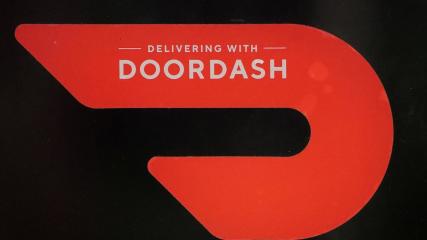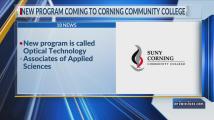What to watch when DoorDash reports earnings
Steven Fox, Fox Advisors Founder & CEO joins the Yahoo Finance Live panel to discuss DoorDash gearing up to report quarterly earnings for the first time as a public company tomorrow afternoon.
Video Transcript
[MUSIC PLAYING]
ZACK GUZMAN: Welcome back to "Yahoo Finance Live." We are spotlighting DoorDash shares here today as the company is set to report its first earnings report as a publicly traded company. The stock is off slightly since its IPO back in December. It's up today. So what should we expect when they deliver their update?
Here to break that down for us is Steven Fox, Fox Advisors founder and CEO. And Steven, you say it beats achievable. It's interesting, because the Street's predicting 215% growth year over year. That's what happens when a lot of people are ordering food here in the pandemic. But talk to me about what you're expecting to hear when they report.
STEVEN FOX: Yeah, thanks for having me. We've ordered a lot of food as well. So we expect going forward that, you know, 215% growth is sort of in the rear view mirror. I think the key number is actually how they do sequentially. So, you know, we're modeling up about 7% quarter over quarter.
And if you think about what's happened with the pandemic, we think that's a reasonable expectation and probably, given some of the lockdowns you've seen in the US, beatable.
AKIKO FUJITA: The question is, really, how much of that momentum can be sustained as we get more people getting vaccinated, as people start to go out more and more? What do you anticipate on that front? Do you think the concerns around that momentum are overblown? Or could we see a significant pullback in activity?
STEVEN FOX: So I think consensus is expecting that momentum slows. It's just a matter of what degree you expect it to slow to. So if you look out to next year's numbers, the year over year growth is somewhere in the 30% range, depending on how you look at it. More importantly, I think, are going to be how they manage that growth.
So for example, are they going to invest more? And what are the unit economics going to look like? I think one of the biggest surprises out of the box for DoorDash is how profitable that they've been able to be while growing so fast. So as growth slows, what does that mean for the Dow margins, conversion margins, et cetera.
ZACK GUZMAN: That's a very good point. And I think, you know, people might overlooked-- might overlook the fact that their tech has gotten better too, kind of prompting people to add things on to the orders that they've already made. You also point to Grubhub notching their strength in cities.
That's something that DoorDash has always kind of differed on and maybe focusing on more smaller cities, shall we say, in the suburbs. Talk to me about maybe how that growth might play into this first uptick we get from them.
STEVEN FOX: Yeah. So there's a lot of-- there's a lot of layers to peel on that onion. So first of all, if you think in terms of adding more restaurants, adding more merchants, the company, when they went IPO, did add about 390,000 merchants on their network. They are providing different types of services for those merchants. They're providing different type of AI and ML that they're continuing to improve on to not just help the merchants, but also help their couriers, drive better earnings.
You've got to remember that this company employs more than 600 engineers that are focused on improving things like career earnings, network liquidity, helping the restaurants with their websites. And restaurants that don't want to use the DoorDash couriers, they're providing services for them as well. So there's a lot of things that they're doing in order to improve their business model.
AKIKO FUJITA: Steve, what do you see as the new revenue drivers for the company? We're talking about food delivery right now. But to the point you make in your note, there's a lot of investor questions around how DoorDash can leverage the network it already has to get into other avenues of delivery. You talk about pharmaceuticals, flowers, groceries. What do you think are the most likely channels, at least if you talk about this fiscal year?
STEVEN FOX: Yeah, so I think there's a couple things in there. It's important to remember when you look at their business, there's a few key headlines we're going to be looking for. One is going to be around subscriptions. Another's going to be around unit economics. A third is going to be around merchant expansion. And the last is around investment plans.
On the investment plan side, that goes to your question, which is, one, how have they grown their subscriptions? How are they incentivizing their 18 million plus consumers to take a subscription model, which has a pretty attractive payback period for DoorDash going forward? And then to your other point, how are they going to expand beyond food delivery?
And they've made some initiatives around groceries. Obviously, that's a huge TAM to go after. Pharmacies and florists are also going to be as well. And the other thing that's interesting is 99% of their sales are still in the US. They have some initiatives already in Canada and Australia. There's been some news reports that they may be interested in going into Japan.
Going into these geographies on a greenfield basis is going to cost some money. So how they plan to expand geographically beyond the US is going to be important as well.
ZACK GUZMAN: Yeah, and the one update too we got kind of new heading into this report a little bit ago was their investment in a food robotics company, one that we spotlighted here on the show, Chowbotics. Talk to me about maybe that. Because that would be different than the delivery model. You got machines out there basically pumping out food. That's a totally different entry point for DoorDash.
STEVEN FOX: Yeah. So similar to how you would look at autonomous vehicles going on to the ride share networks for Uber and Lyft, I think you should think about robotics as sort of providing maybe less than 10% of deliveries in the future. It's going to go after specific purpose type of delivery, where they can best leverage that investment.
It's not going to all of a sudden in five years be robots delivering all their food. But there's a lot of opportunities to automate and, at the same time, still make their couriers more profitable by taking away less profitable routes for them. So I think it's something to watch. It's interesting to talk about.
The investments there, I don't think, are going to move the needle for me and you when we look at the company. But they clearly want to invest in this area going forward. And it makes sense.
AKIKO FUJITA: OK, we'll be watching when the company reports after the bell on Thursday. Steven Fox, Fox Advisors founder and CEO. It's good to talk to you today. And a programming note, we will be speaking to the CFO of DoorDash, Prabir Adarkar joining us this Friday after reporting on a Thursday. That's at 11:00 AM Eastern right here on Yahoo Finance.








